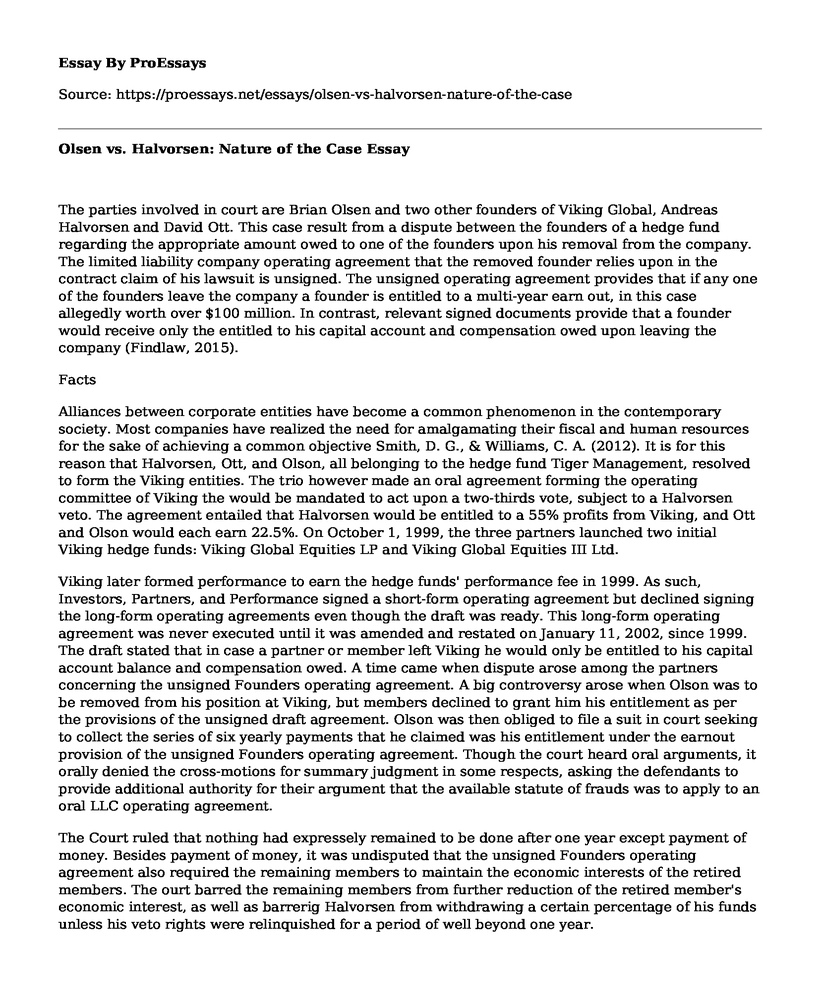The parties involved in court are Brian Olsen and two other founders of Viking Global, Andreas Halvorsen and David Ott. This case result from a dispute between the founders of a hedge fund regarding the appropriate amount owed to one of the founders upon his removal from the company. The limited liability company operating agreement that the removed founder relies upon in the contract claim of his lawsuit is unsigned. The unsigned operating agreement provides that if any one of the founders leave the company a founder is entitled to a multi-year earn out, in this case allegedly worth over $100 million. In contrast, relevant signed documents provide that a founder would receive only the entitled to his capital account and compensation owed upon leaving the company (Findlaw, 2015).
Facts
Alliances between corporate entities have become a common phenomenon in the contemporary society. Most companies have realized the need for amalgamating their fiscal and human resources for the sake of achieving a common objective Smith, D. G., & Williams, C. A. (2012). It is for this reason that Halvorsen, Ott, and Olson, all belonging to the hedge fund Tiger Management, resolved to form the Viking entities. The trio however made an oral agreement forming the operating committee of Viking the would be mandated to act upon a two-thirds vote, subject to a Halvorsen veto. The agreement entailed that Halvorsen would be entitled to a 55% profits from Viking, and Ott and Olson would each earn 22.5%. On October 1, 1999, the three partners launched two initial Viking hedge funds: Viking Global Equities LP and Viking Global Equities III Ltd.
Viking later formed performance to earn the hedge funds' performance fee in 1999. As such, Investors, Partners, and Performance signed a short-form operating agreement but declined signing the long-form operating agreements even though the draft was ready. This long-form operating agreement was never executed until it was amended and restated on January 11, 2002, since 1999. The draft stated that in case a partner or member left Viking he would only be entitled to his capital account balance and compensation owed. A time came when dispute arose among the partners concerning the unsigned Founders operating agreement. A big controversy arose when Olson was to be removed from his position at Viking, but members declined to grant him his entitlement as per the provisions of the unsigned draft agreement. Olson was then obliged to file a suit in court seeking to collect the series of six yearly payments that he claimed was his entitlement under the earnout provision of the unsigned Founders operating agreement. Though the court heard oral arguments, it orally denied the cross-motions for summary judgment in some respects, asking the defendants to provide additional authority for their argument that the available statute of frauds was to apply to an oral LLC operating agreement.
The Court ruled that nothing had expressely remained to be done after one year except payment of money. Besides payment of money, it was undisputed that the unsigned Founders operating agreement also required the remaining members to maintain the economic interests of the retired members. The ourt barred the remaining members from further reduction of the retired member's economic interest, as well as barrerig Halvorsen from withdrawing a certain percentage of his funds unless his veto rights were relinquished for a period of well beyond one year.
Yes, the dissenting opinions were raised about the contrast to real estate contracts. Opponents to the courts decision proved that part performance was relatively definite, clear, and substantial. The nature of evidentiary facts categorically asserted to show part performance of an agreement that is not performable within one year, would be imprecise, vague, subjective, and therefore susceptible to fraudulent application.
I concur with the courts decision to put sanctions on Halvorsen and his party and for ruling in favor of Olson. This would be a lesson to other people who may be tempted to make such perpetrations that are aimed at defrauding partners and disgruntling them by contravening the provisions of the underlying agreements Miller, R. L. R. (2014). The law should however, emphasize the need for companies to stick to signed agreement whenever they form amalgamations to work together for certain goals.
References
Smith, D. G., & Williams, C. A. (2012). Business organizations: Cases, problems, and case studies. New York: Wolters Kluwer Law & Business.
Miller, R. L. R. (2014). Business law: Text and cases : the first course.
Cite this page
Olsen vs. Halvorsen: Nature of the Case. (2021, Mar 05). Retrieved from https://proessays.net/essays/olsen-vs-halvorsen-nature-of-the-case
If you are the original author of this essay and no longer wish to have it published on the ProEssays website, please click below to request its removal:
- Article Analysis Essay on "Acting out Culture"
- Corporates Misdeeds: The Biggest Business Scandals of 2017 Essay
- Factors That Make up Matesky and Bundy Criminal Profiling Paper Example
- Research Paper on HarbourSide Hotel
- Essay Sample on Juvenile Justice: From Punishment to Rehabilitation
- Essay Sample on Prisons Face Healthcare Crisis: Prisoners Deserve Better
- Essay Sample on Situation Crime Prevention: A Prevention Aspect Since 1940s







